As I’ve written about before, Tonka and I have been walking. Mostly, we’ve been in the covered arena, on safe footing, and sheltered from bitter cold winds. Two weeks ago, during a break in the weather, we managed to get down the road a bit. Tonka was on alert, but stayed within the bounds of sane behavior. So, last week, when it warmed up above freezing, I thought we’d go a bit further.
Tonka and I set off.
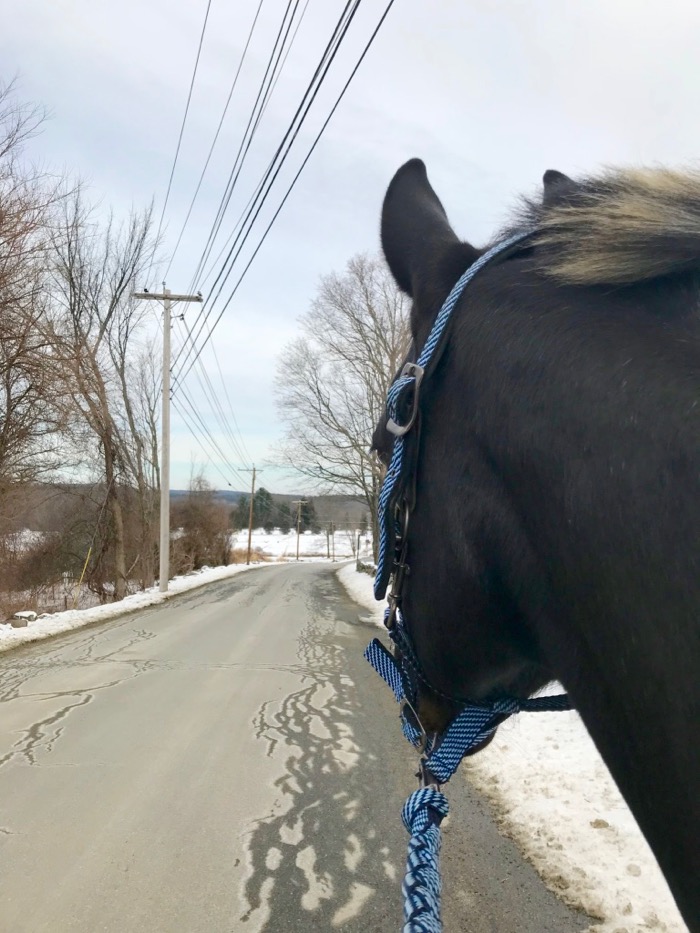
This time, the horses at the stable down the road were in the fields across the street from their barn. Tonka was very aware of that! We passed by them, and I took this photo. I thought that Tonka looked quite handsome.
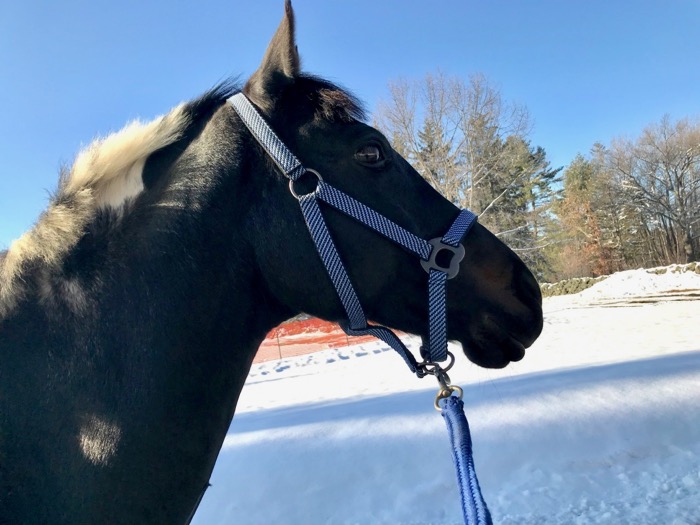
But notice that ever so thin line of white in his eye? The bulge in his lower neck? I did, but I wanted to walk a full mile, so went another hundred-feet up the road so that we’d clock a half-mile before turning around.
That might have been a mistake.
Tonka went over threshold. I’ve written a bit about threshold here. Do you know the story about the straw that broke the camel’s back? A man loads a camel’s pack with straw to take it to market. He puts on a full load, but has more to take, so adds another bundle. The camel bears that weight, so the greedy handler adds more. The camel buckles a bit at the knees, but stoically stands. It’s still not enough for the man. He adds just one more stalk. And with that seemingly inconsequential bit of straw, the camel falls to the ground.
So, back to my tale about our walk down the road. We made it a half mile and turned around. At the top of that little hill is Tonka’s barn.
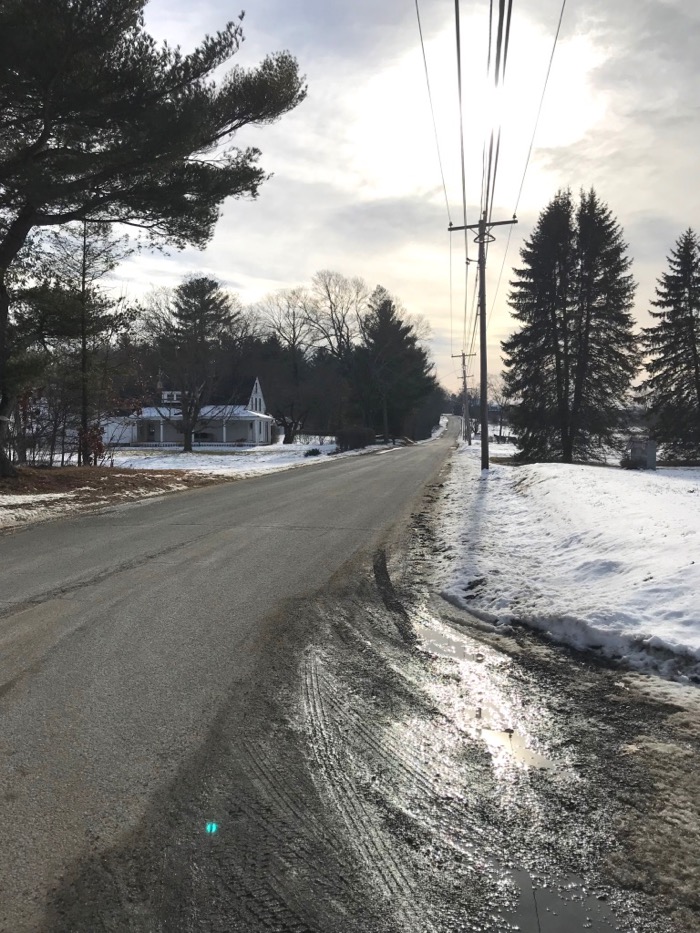
That’s where his friends are, his safe stall, his hay. We were further down the road than we’d ever been. A few vehicles had noisily driven by, kicking up road sand. There were horses pacing along the fence line. It was too much. Tonka was over threshold and all he wanted was to get back home.
I have no photos for what happened next. I was too busy.
Energy seemed to fill his body. It made my horse bigger. I could feel him surge forward. There was not a lot that I could physically do to keep Tonka with me if he decided to take off. I was holding onto an 1,100 pound horse with a cotton lead rope. What I had for control is that Tonka is trained to walk politely next to me. Walking next to me has positive associations. He also knows that if I put pressure on his halter via the lead line, that he’s to slow down and stay with me. Tonka tried, he really did, however, there was prancing. A bit of passage. Some piaffe.
Cars drove by. We tried to stay at the edge of the road. But we also had to avoid ice.
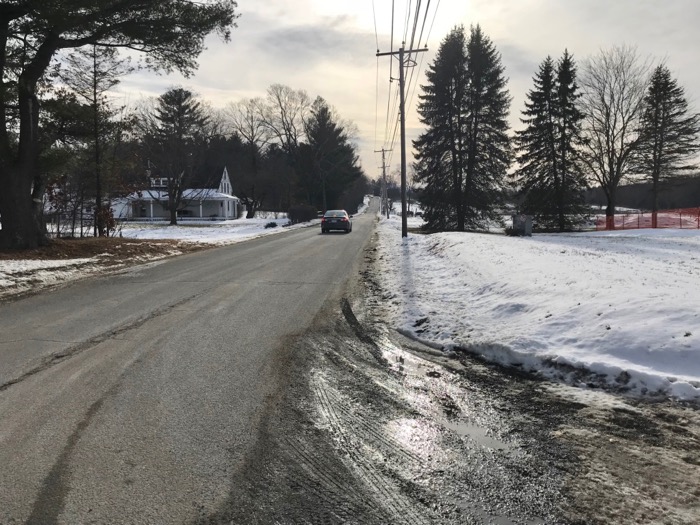
A FedEx truck headed towards us. I waved at him in that universal stop language. The driver ignored me and kept coming. I slowed Tonka down, but his contained energy had to go somewhere. Tonka reared. Then all four feet came off of the ground. Then the hind legs kicked out in a capriole. We were in the middle of the road, putting on quite a show. The driver stopped. A glance at him told me that he was not pleased. Fortunately, Tonka and I made it safely past him.
As we made our way up the road, Tonka continued to leap, rear and kick out. The closer we got to home, the more wound up he became. Tonka came very close to kicking a car as it drove by. (Do people not understand that when they see a fractious horse in the road that they should slow down and go wide? The answer is, no, they do do not.)
While all of this was going on I was thinking, could my horse be barn sour? Really? My horse that usually slows down on the way home when on trail rides? It was clear that yes, in this situation, Tonka was barn sour. He was like a trout heading upstream. Bounding, leaping, blind to the dangers. He was going to get home no matter what.
What I could appreciate at that moment, was that despite his anxiety, Tonka continued to listen to me. He stayed at my side (albeit a lot more energetically than usual!) He never once turned on me to let out his emotions. He never struck or body-slammed me. In fact, with all of his cavorting, Tonka was careful not to hurt me. Tonka was trying so hard to do right. But he was over threshold. This was not a training moment. His brain was not in a place that could absorb a lesson. We had to get back.
Forcing him to stand still, or to “move his feet” and back up would just have added to his anxiety. It would have also taught him that along with the big world being scary, that I was too, because making him do anything like that would have required punishing force. That said, it wasn’t a free-for-all run for home. I didn’t allow him to go forward when rearing and leaping. Using the lead line, my voice, and my body language, I could get a momentary stop in the action. As soon as all four hooves were on the ground, we’d take a step forward. Going home was what Tonka wanted, and he became aware that it was contingent on walking (even if that walking was a stunningly beautiful passage that is not his usual way of going!)
We arrived back at his farm safely. I expected an explosion of activity when I let Tonka loose in his paddock, but all he did was put his head down and slowly munch his hay.
I have to face the fact that Tonka has become barn sour. A winter in one place shrinks a horse’s perceived safety zone. The answer to this is to gradually expand his world. I have already started this training. I am taking Tonka out on the road, but in small incremental distances. I’m keeping him below threshold, and rewarding him for standing quietly when facing towards home.
This training uses two useful techniques – desensitizing and counter-conditioning. Both will be employed to prevent this barn sour behavior from becoming Tonka’s norm. I’ll be writing another blog post about them in the near future. Also! I will be giving a talk about the Barn Sour Horse at the Equine Affaire in Columbus, Ohio, in April. Keep an eye on my events page for more details. (If you have a group that you’d like me to come and speak to, please email me to discuss!)
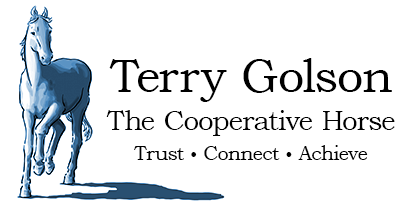

I find it interesting that horses seem to learn unwanted behaviors so easily, but it takes consistent and sometimes lengthy training to unlearn those same behaviors. I’m sure that with your unending patience, Tonka will get back to his safe/sane self in no time. Also, it is very unfortunate that most people in today’s world do not seem to have any idea how dangerous it can be to pass a horse that has lost its brains, but it seems to have become the norm I think most people are so removed from horses, that they believe can control our 1200 lb animals with some magic wand. Wouldn’t that be nice if we could!!
If a horse is stressed and finds a solution to the problem, that behavior will stick! Then you have to convince that you have another solution, and you’re right, that takes patience and skill. It’s so much easier to train them before they’re stressed. Of course, that moment is easier to see with hindsight 🙂
It seems that wintertime is prime season for episodes of being barn sour. I joke that I ride out on a 90 year old horse, and return home on a 2 year old black stallion! I’m not sure if this is the correct thing to do, but our trails have pastures off of them and if there is too much prancing, grunting and general bouncing, I will turn him into a pasture and try to get his brain back by all of a sudden not going home after all. It is scary, and I’m sure your adrenaline was flowing. I’ll be interested to see how you train for times like this. I would like a few ideas on this behavior too! P.S. My horse also acts like this when we go out in a group. It doesn’t matter if he’s first, middle or last. Interesting creatures they are.
It is scary. You’re on the right track about doing something other than continue on a bouncing dragon. I’ll get into that in another post.
First of all I want to say that I love your posts!!! I own 4 Arabians and I have a foal expected in May. I probably missed this post stating what breed of horse that Tonka is, but I am curious. He is so beautiful and such an interesting horse. he also appears to be very intelligent.
Thank you! I love getting positive comments. It keeps me writing! Tonka is a registered American Paint Horse. I recently found out more about his breeding. Read here.
Oh Terry how scary. I to have experienced this with Harley. I feel so powerless and Really there is nothing you can do but pray to get back safely. It been a long winter. I wonder if it would have been as bad if one of his buddies was also along for the walk? I know my first loading on the trailer will be hell, so I thing we will buddy up for the first venture out
Buddies can help, and can be part of training. But at some point, you also need to train to have them go out on their own. Be smart about choosing when you do that training. You’re prudent to have a buddy for the first venture out after a long winter. Partly for your own safety! It’s good to have someone around just in case…
Thank-you for sharing it all with us – the good, the bad, and the scary! After your post about threshold I started one of my own, but never finished it. I need to revisit yours, and mine, and read the rest of this story, too.
I look forward to reading yours!
Wow, this can be so scary for you. A strong, panicked horse lurching around and little you on the end of a cotton rope. I hope you can find someone to walk with you and take on managing all the passing vehicles. (I never cease to be amazed at what morons people can be around horses on the road.) Sounds like you kept your head and you both survived intact, which is of course, what matters most. Would walking with another horse and person be useful, or do you think it would undermine what you’re trying to accomplish addressing the herd-bound behavior?
Depending on the horse, a buddy is a good idea. In this case, though, he needs to learn to be calm on his own. Since he’s been fine before, I’m hoping a quick refresher will do the trick!
Very scary, glad you are both okay. Never ceases to amaze me how stupid some drivers can be around horses. They need to remember that HORSES were here FIRST!!! 🙂
Bicyclists, too. They pass much too close, and a shying horse could topple them!
It sounded scary but you were the best person to know how to handle Tonker. It amazes and angers me that drivers can be so stupid. On my daily delivery rout there is a part where there are horses. I always go slow, go wide and stop and wait if I see a problem happening. I always receive a polite wave back. I can’t understand why anyone wouldn’t do this.
Thank you for your polite and careful driving!!!
Thank you so much for this post, Terry. My mare became ‘barn sour’ last winter, after an unsettling move, and we’re still working on it as we go through this winter. She’s delighted to go out with a buddy; the big issue is going out without another horse. So we’re doing a lot of small, reassuring walks and aiming to build up slowly to where we were originally (she was OK about going out alone before the move). So your example has cheered me up – “it’s not just me” etc. Glad you both got home safe and sound.
I moved Tonka last June, and I agree with you that this changed behavior is something tied into a new barn. I do find that Tonka is braver if we trailer somewhere than if we walk away from the barn. I’m hoping to get him out a lot this spring, and I think that will carry over to being able to walk out his front door.
Also! I realized today that the “tipping point” for his fear is the sound of tires on wet sand on the road. I agree with him that it’s an awful and scary sound! Now to counter-condition it. More on that in an upcoming post!
Once again, I enjoy your posts. Glad you got back safely. Any of us that has been around horses any length of time has had similar episodes. And I don’t know why people are so rude anymore. I used to ride from home down the gravel roads and people would slow down and be nice, but not anymore, so now I trailer to horse trails to ride.
Yesterday I attempted to stand with Tonka at the edge of the driveway, to start our retraining. A car sped past, the sand (what’s sprayed on the road to prevent ice) spewed up. Tonka was scared. I don’t blame him. I’m thinking that, although my horse was well-trained on the roads, that the drivers are not, and I shall stay off of them!
I had a horse many years ago that I used when I was riding the roads, and he paid no attention to cars, trucks, whatever, until one day a truck went by, and I don’t know what happened but after that he either bucked, or bolted whenever a vehicle came by. Needless to say it was nerve wrecking to me and I started tensing up when I heard something coming and that just aggrevated the issue. Since it was late Spring and the grass was nice and green I finally started stopping him and letting him graze when someone drove by, and after a while he got over it. So, all this to say it might be possible for Tonka to become “untrained” for any riding on a road anytime if you didn’t decide to skip the road walking for now. So for what it’s worth I think you made a good decision.
I appreciate this comment. Grazing time is so beneficial!… if I ever see green grass again…. 🙂